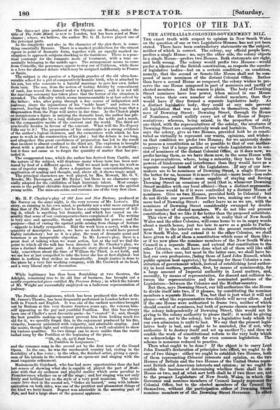it COatrto.
The three-act play produced at the Olympic on Monday, under the title of The Noble Heart, is new to London, but has been acted at Man- chester ; where, we believe, the author Mr. G. H. Lewes played one of the principal parts. In the simplicity and also in the character of the plot there is some- thing essentially Byronic. There is a marked predilection for the utmost rigour in point of dramatic form, together with an equally marked in- clination to approach subjects shocking to the fastidious. There is a prac- tical contempt for the romantic mode of treatment, with a tone es- sentially belonging to the middle ages. The arrangement seems to come from COrneille, the personages appear to step out of Calderon, while there is a love for abstract debate which may be assigned indifferently to France or Spate• The subject is the passion of a Spanish grandee of the old ultra-hon- ourable school for a girl of comparatively humble birth, who is attached to his son, but who consents to a hateful marriage to save her own father from 'ruin. The son, from the notion of testing fidelity by concealment of rank, has wooed the damsel under a feigned name; and it is not till the marriage ceremony has taken place that the horror of the situation is revealed. The difficulty which seems insurmountable is at last solved by the father; who, after going through a due course of indignation and jealousy, obeys the injunctions of his "noble heart" and retires to a convent, leaving the lovers and the audience in the pleasing hope that a dispensation from the Pope will arrive in due time. As the Church playa so conspicuous a figure in untying the dramatic knot, the author has pre- pared his catastrophe by.a long dialogue between the noble and a monk, on the comparative merits of the convent and the world. The third act practically decides in favour of the convent. What will the No-Popery folks Say to it ? The preparation .of his catastrophe is a strong evidence of the author's logical dearness, and the earnestness with which he has gone to work in the construction of his plot ; but the debate is too long, and altogether this great carefulness of preparation has led to the result that incident is almost confined to the third act. The explosion is brought about with a great deal of force, and when it does come it is startling ; but it does not cause us to forget the quantity of matter that has pre- ceded it.
The exaggerated tone, which the author has derived from Castile, and the nature of the subject, will displease many whose taste has been nur- tured by food of a differmt species. StilriVe must look upon his work as one of superior stamp. It shows a departure from conventionalities, an application of reading and thought, and, above all, it shows tragic mind. The principal characters are well played, by Mrs. Mowatt, Mr. G. V. Brooke, Mr. Davenport, and Mr. Ryder ; but there is no character espe- cially adapted for the exhibition of high histrionic talent. Most conspi- cuous is the gallant chivalric deportment of Mr. Davenport as the spirited young noble. The Mise-en-seene and costume are of the very that class.
•


























 Previous page
Previous page